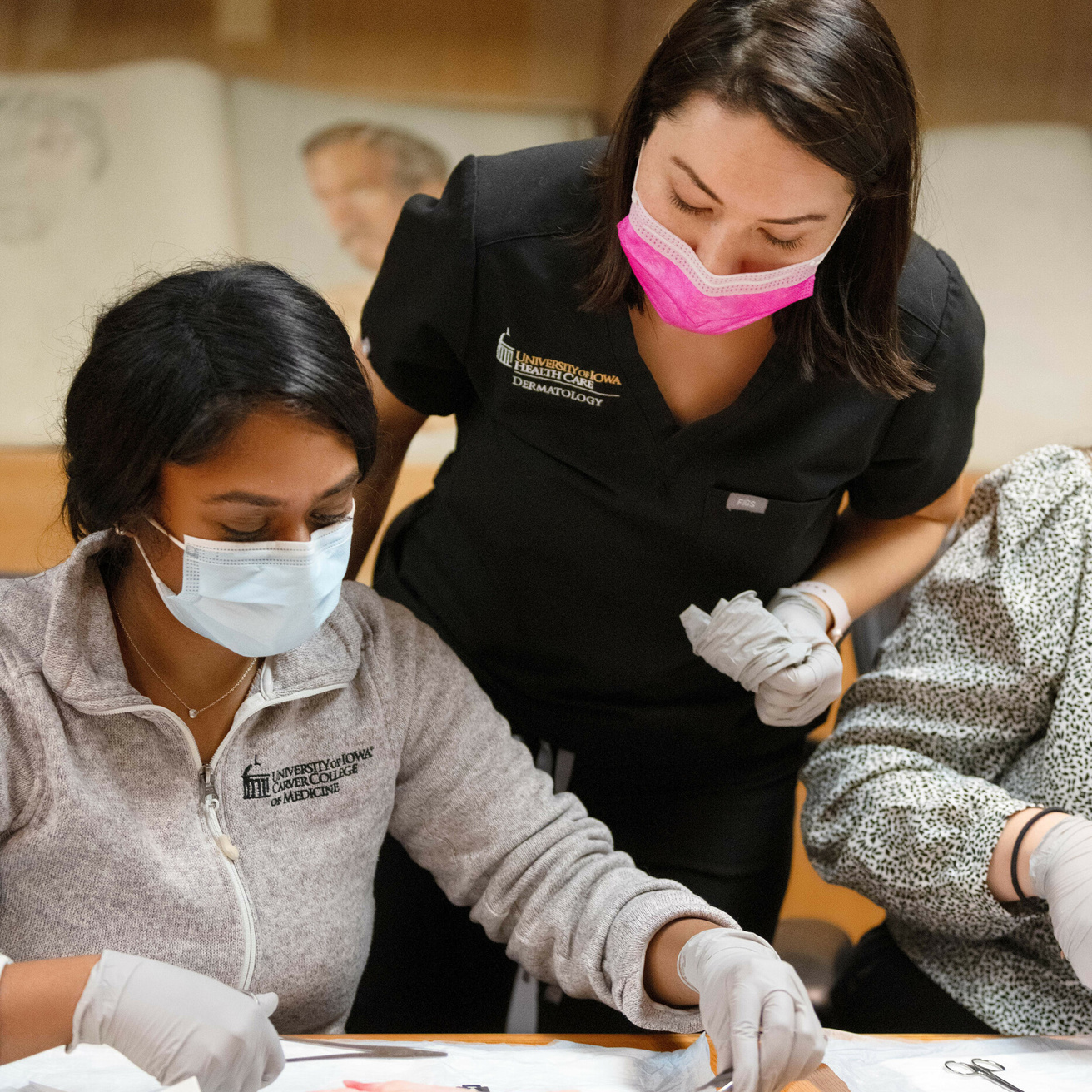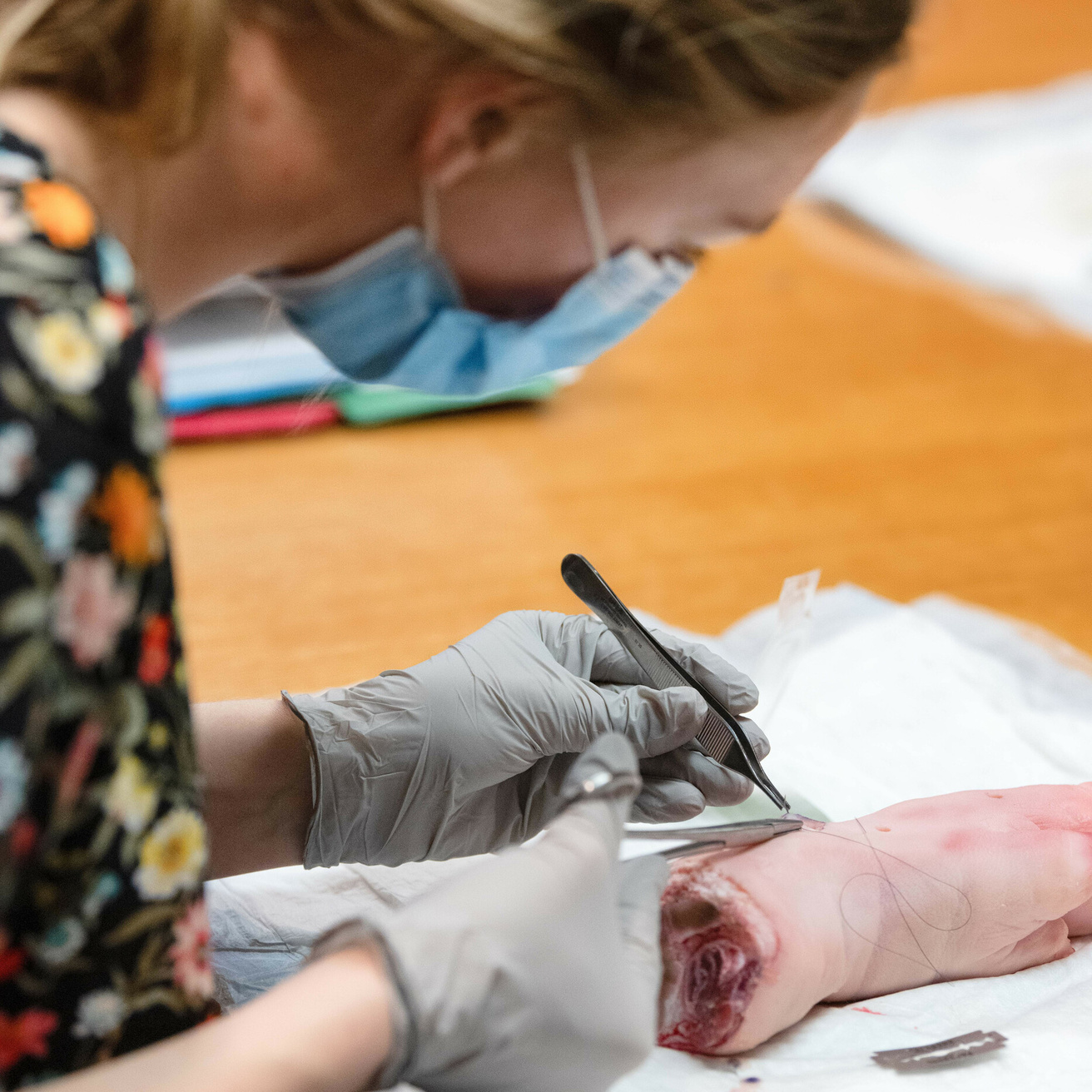Main navigation
Medical Student Education
The Department of Dermatology offers a range of educational opportunities to prepare future dermatologists, as well as non-dermatologist clinicians. Our medical education curriculum includes a selective clinical clerkship and advanced electives in clinical practice, research, and dermatopathology.
The selective clerkship provides an introduction to both common and uncommon dermatologic conditions, offering students a foundational understanding of dermatology as a specialty. Our advanced electives build on this knowledge, offering students additional hands-on clinical experience, dedicated time to pursue dermatologic research, and a deeper familiarity of dermatopathology.
Dermatology Clerkship (DERM:8301)
Course Structure:
Student growth and learning will be facilitated by clinical experience in conjunction with computer-based tutorials, interactive physician-led educational sessions, and a hands-on suturing/procedure activity. Students will rotate through the UIHC Dermatology Clinic, the IRL Dermatology Clinic, the Pediatric Specialty Clinic (pediatric dermatology), and the Iowa City VA Medical Center. Students will have the opportunity to participate in inpatient consultations, dermatologic surgery, and the dermatopathology service, according to interest and availability.
Course Objectives:
- Students should demonstrate the following clinical skills:
- Skill in obtaining a clinical history
- Physical examination – how to perform a complete skin examination
- Accurate and complete documentation of clinical encounter
- Use of laboratory methods to aid in diagnosis
- Ability to present patient information effectively, efficiently, and thoroughly
- Competence in generating a differential diagnosis
- Judgment in determining appropriate care, including practicing evidence-based medicine


Visiting Medical Students
The Dermatology Department offers fourth-year electives to visiting medical students enrolled in a LCME accredited medical school during the months of July through October.
Dermatology Electives
Dermatology Elective (DERM:8401)
During this 4-week elective, the student will:
- acquire a deeper familiarity with basic skin anatomy, physiology and pathology
- understand the importance of morphology and description of diagnosing cutaneous disease
- learn how to perform and document a complete skin examination
- learn to generate appropriate differential diagnoses for skin conditions
- learn the most common and clinically most significant dermatologic conditions
- become familiar with fundamental dermatologic diagnostic techniques
- experience how clinical pathologic correlation optimizes diagnosis and treatment
- become familiar with minor skin surgical procedures
- formulate appropriate plans for management of patients with dermatologic disease
This will be achieved through experience:
- in the UI Health Care Dermatology Clinic and IRL Dermatology clinic
- at Iowa City Veteran Affairs/VA Medical Center
- with specially scheduled surgery patients
- on the UI Health Care Dermatopathology Service
- with inpatient consultations
Research in Dermatology (DERM:8497)
The purpose of this elective is to provide experience in dermatological research. This will be achieved by assignment to a primary investigator (PI) within the department. The student will be expected to set clear goals and expectations in concert with the PI, with whom the student will regularly meet throughout the experience.
Dermatology On-Campus (DERM:8498)
Individually arranged by student with approval of the department. This elective is an intensive 2- or 4-week block focused on Dermatopathology.
Duties and Learning Objectives:
- The student will acquire a deeper familiarity with basic skin anatomy, physiology, and pathology,
and understand the importance of morphology and description of diagnosing cutaneous
disease. - The student will learn and implement pathology terminology used for describing histological
images with the goal of broadening and enriching differential diagnoses for dermatologic
conditions. - The student will work alongside dermatology residents and dermatopathology staff to review,
analyze, describe, and interpret dermatopathology specimens (primarily punch and shave biopsies). - The student will generate differential diagnoses based on histologic features, incorporating histochemical,
immunopathologic, molecular, and microbiologic data in order to make clinicopathologic correlations.
Dermatology Off-Campus (DERM:8499)
Individually arranged by student with approval of the department. Credit for specially arranged courses is available ONLY if the course of study has been approved a minimum of 4 weeks in advance. CCOM requires that your away rotation be 4 weeks in length. Most sites are this long; however, exception requests for away rotations less than 4 weeks may be possible in some circumstances, pending OSAC Dean approval.
Dermatology Specialty Pathway
Interested in applying to Dermatology? Here are some general considerations:
- Dermatology is regarded as a highly competitive residency, with the medical school academic record and USMLE scores generally comprising the core of the application.
- Research (DERM:8497) or other scholarly activity represents another key element of the portfolio, requiring advance planning and scheduling. The dermatology research elective is most effectively utilized with discussion and planning with the faculty mentor well in advance of the elective (e.g. to allow for IRB approval, etc.)
- The advanced dermatology elective (DERM:8401) provides the opportunity to explore the specialty more in depth, offers potential opportunities to find research/scholarly experience, and enables contact with faculty who can write letters of recommendation. As such, the advanced dermatology elective, while not required for application, is recommended for all potential applicants.
- Dermatology electives (DERM:8499) at other medical schools, while not required, may be beneficial in providing additional experience in the specialty, documenting dedication to the field, offering potential research opportunities, and facilitating possible letters of recommendation. Advance planning is also crucial here.
- Seeking advice from departmental faculty is strongly encouraged for any student considering application to dermatology residency. The clerkship director and coordinator are available to serve as advising resources.
Vincent Liu, MD
Clinical Professor of Dermatology
Department of Dermatology
University of Iowa Hospitals and Clinics
200 Hawkins Drive 40025-Z PFP
Iowa City, IA 52242-1009
Email: vincent-liu@uiowa.edu
Tori Barnes
Department of Dermatology
University of Iowa Hospitals and Clinics
200 Hawkins Drive 40025-Z PFP
Iowa City, IA 52242-1009
Email: victoria-barnes@uiowa.edu